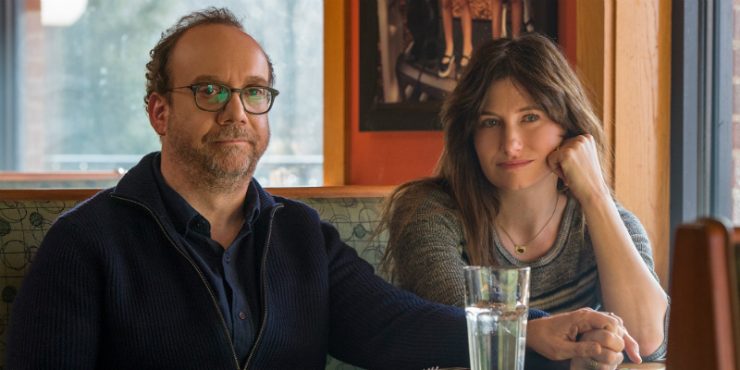The families in Private Life – the first film from Tamara Jenkins since The Savages in 2007 – are disgruntled and argumentative, worn down by the familiarity of partnership. They have their reasons. In the case of Rachel and Richard (Kathryn Hahn and Paul Giamatti), their lives are filled with incredible tension after years of unsuccessful fertility treatments. He’s a former theater maestro turned entrepreneur and she’s a published author, but their success is modest and not fulfilling in the same way a child would be. Trying to conceive after the age of forty has proven difficult for the couple, and even while getting the ball rolling on adoption, they are still trying their luck with invasive, complicated IVF treatments. A process that includes shots of hormones and a half a dozen different drugs (and a very low percentage of success), the saga has put an incredible strain on their marriage.
Things become even more complicated with the arrival of Sadie (Kayli Carter), the twenty-five year-old step-daughter of Richard’s brother Charlie (John Carroll Lynch). Having flamed out at Bard College, Sadie decides to move to Manhattan against the wishes of her demanding mother, Cynthia (Molly Shannon), and live a creative city life, gaining inspiration for a possible career in writing. Having offered their home as a possible landing spot if Sadie ever needed one in New York, the couple has their bluff called and end up in a different kind of parenting situation. Naïve and outspoken, the product of outrage culture and over-parenting, Sadie’s residence presents a new assortment of complications into their lives. Not the least of which is their doctor’s suggestion that their only realistic shot at conception at this point may be through egg donation.
Jenkins’ tart, unsentimental film has the unsparing eye of Kenneth Lonergan, in that it taps into our most common grievances and humiliations. Rachel and Richard have eruptive shouting matches at home, spurred on by their helplessness in the face of their waning fertility. Outside, they perform the part of a happy couple, and Sadie’s residence means that that performance must now go on at home as well. Also like Lonergan, Jenkins is brilliant at piercing the tragedy with dollops of humor, meant to draw out the humanity of her characters, and release the pressure valve of anxiety. Her script makes hay of the absurdity of the fertility industry, like the anesthesiologists who have the same routine when knocking out patients, and the doctors who are either too cruel or too friendly to be comfortable with (Denis O’Hare has a very funny cameo as a doctor who likes to put on prog rock while performing inseminations).
Like The Savages, Private Life has a preternatural understanding of the ways in which families behave and interact. Desperate for attention and approval, Sadie throws herself into the darker corners of Rachel and Richard’s life, which makes the couple reveal themselves like they’ve never have before. Giamatti and Hahn, two veteran comedic performers, know that any humor there is must come from their desperation, from the discomfort of their biological mishaps. In a short montage early in the film, we learn just how crushing their search for a child has been, creating emotional stakes that ripple throughout the film. Giamatti’s resigned slubbishness is perfect for Richard, but it’s Hahn who does a lot of the heavy lifting, playing a woman poked and prodded, emotionally demolished by the public nature of her private misfortune.
It’s Kayli Carter, though, who might have the film’s best performance. Carter plays Sadie, a certain kind of young girl who comes to NYC to remake her life without any kind of plan. She’s Greta Gerwig in Frances Ha with a place to crash. Her battles with Cynthia (and Shannon, as always, is giving her own kind of perfect performance) show the turmoil of parentage, the other side of Rachel and Richard’s dreams of lullabies and basinets. Carter’s Sadie is the perfect balance of clueless and intelligent, so perfectly encapsulating the charm and exasperating nature of being in your mid-twenties with only a half-interest in your education. She is right on the verge of learning the horror show that life can turn into. Cynthia wants to keep her from it, while Rachel and Richard give her a first-hand display of what it’s like to get older.
Private Life doesn’t allow itself anything tidy or convenient, and Jenkins’ script has no time for catharsis. After a years-long journey, Rachel and Richard’s chances become slimmer and slimmer, and Private Life doesn’t believe in miracles. So in a way, the film has very little interest in how the couple will get their child, but how they will receive their latest disappointment. That Jenkins can tell this story with such a precise understanding, and still manage to make it funny, is proof that there are few filmmakers more adept at understanding the human condition.
Written and Directed by Tamara Jenkins










